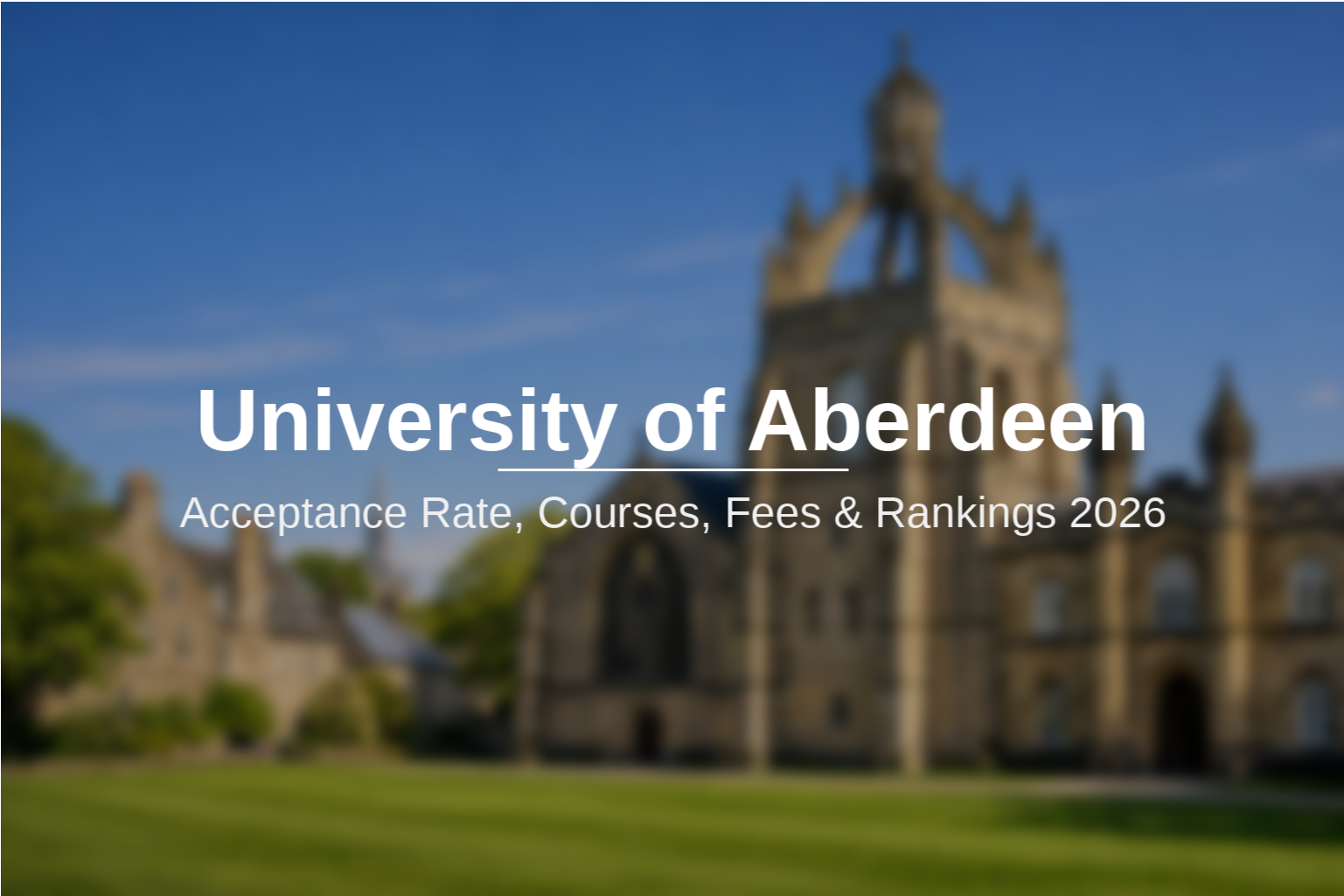The University of Glasgow, as a prestigious institution in the UK, attracts countless outstanding students from all over the world to apply every year. However, with a highly competitive application season, acceptance rates become one of the biggest concerns for many applicants. This guide will take an in-depth look at University of Glasgow admissions in 2025 to provide you with the most accurate and comprehensive information. Whether you are applying for undergraduate or postgraduate study, you will find a valuable reference here.
Overall University of Glasgow Acceptance Rate
Undergraduate
70%
Postgraduate
52%
According to the latest figures, the University of Glasgow has an undergraduate acceptance rate of 70% and a postgraduate acceptance rate of 52%. For the 2023-2024 academic year, the University of Glasgow admitted over 33,000 students, of which 15% were international students. Whilst admissions are down for the 2022-2023 academic year, overall admissions have maintained an upward trend over the last decade. It has remained above 30,000 admissions per year beyond the 2019-2020 academic year.
| Total Number of Students | |
|---|---|
| Year | Total Headcount |
| 2023-24 | 33,747 |
| 2022-23 | 35,510 |
| 2021-22 | 37,800 |
| 2020-21 | 32,856 |
| 2019-20 | 29,520 |
| 2018-19 | 28,713 |
| 2017-18 | 27,469 |
| 2016-17 | 26,502 |
| 2015-16 | 25,562 |
| 2014-15 | 24,873 |
University of Glasgow Acceptance Rate Compare to Russell Group
The University of Glasgow has an average acceptance rate of 58.3%, which is the eleventh highest out of the 24 universities in the Russell Group. The highest acceptance rate was 84% at the University of Southampton, while the University of Oxford Street was the hardest university to get into, with an acceptance rate of just 16%.
| Russell Group Acceptance Rates | |
|---|---|
| University of Southampton | 84.0% |
| University of York | 79.0% |
| University of Sheffield | 78.6% |
| University of Nottingham | 74.0% |
| University of Exeter | 73.0% |
| University of Liverpool | 69.2% |
| Newcastle University | 68.2% |
| Cardiff University | 67.2% |
| Durham University | 67.2% |
| University of Warwick | 63.0% |
| University of Glasgow | 58.3% |
| University of Bristol | 55.0% |
| Queen Mary University of London | 51.3% |
| University of Manchester | 51.0% |
| University of Edinburgh | 47.0% |
| University of Leeds | 47.0% |
| University of Birmingham | 45.1% |
| King’s College London | 41.3% |
| Queen’s University Belfast | 35.0% |
| Imperial College London | 25.9% |
| University College London | 24.8% |
| University of Cambridge | 21.2% |
| London School of Economics | 16.3% |
| University of Oxford | 16.0% |
Acceptance Rates by Major & Programmes
Although the overall acceptance rate at the University of Glasgow is between 55% and 70%, the requirements and difficulty of acceptance vary across different majors and programmes. Therefore, you should tailor your application strategy to your target specialism.
| Acceptance rates for different majors | |
|---|---|
| MSc Veterinary | 89% |
| MSc Psychology | 79% |
| MSc History | 73% |
| LLM Law | 64% |
| MMus Musicology | 56% |
| MLitt English Literature | 53% |
| MSc Statistics | 48% |
| MSc Chemistry | 45% |
| MSc Economics, Banking and Finance | 44% |
| MAcc Accounting and Finance | 43% |
| MBA | 28% |
There are many factors that affect the acceptance rate of programmes. For example, Adam Smith Business School, the ace college of the University of Glasgow, has the highest number of applicants and the most intense competition. Financial engineering, international accounting and financial management and other specialisations in the School have significantly lower acceptance rates than other specialisations due to good employment prospects and high subject rankings. Other business programmes also had low acceptance rates due to the huge number of applicants. Comparatively, liberal arts majors such as Philosophy, History, and Environmental Management are relatively less popular, have fewer applicants, and have higher acceptance rates. In addition, engineering and medicine programmes require a lot of laboratory equipment and clinical opportunities, and have limited enrolment, resulting in even lower acceptance rates.
| Most Competitive Programmes | |
|---|---|
| MSc(DentSci) Oral and Maxillofacial Surgery | 7.50% |
| MSc(DentSci) Endodontics | 8.60% |
| MSc Creative Industries and Cultural Policy | 14% |
| MSc Management with International Finance | 15% |
| MSc(MedSci) Applied Neuropsychology | 18% |
| MSc Medical Physics | 19% |
| MSc Media Management | 20% |
| MSc Conservation Management of African Ecosystems | 21% |
| MSc Management | 25% |
| MSc International Strategic Marketing | 25% |
| Least Competitive Programmes | |
|---|---|
| PgCert Child Health | 96% |
| MSc Medieval History | 94% |
| CPD Teaching English for Academic Purposes | 92% |
| MSc Russian, East European and Eurasian Studies | 92% |
| MSc Geoinformation Technology and Cartography | 90% |
| MSc Stem Cell Engineering | 90% |
| MSc Geospatial and Mapping Sciences | 90% |
| MLitt Art History | 86% |
| MEd Professional Practice | 86% |
| MSc Sensor and Imaging Systems | 85% |
Applying University of Glasgow
Eligibility Criteria
Whilst different programmes at the University of Glasgow may have different admission criteria, there are some general criteria to follow. It should be noted that certain art programmes may require an additional portfolio or an interview. Please check the University of Glasgow programme website for specific information.
UG Admission Requirements:
High-school certificates with 75% marks
PG Admission: Requirements:
Upper Second Class honours degree (2:1)
| Languare Requirement | ||
|---|---|---|
| English Language Qualification | Minimum score required for UG | Minimum score required for PG |
| IELTS | 6.5 (No sub-test below 6.0) | 7.0 (No sub-test below 6.5) |
| TOEFL | 90 ( R: 20, L:19. S:19, W: 23) | 90 ( R: 20, L:19. S:19, W: 23) |
| PTE | 60 | 68 with a min of 60 |
Documents Required
- Official academic transcripts
- English language proficiency test scores
- Scanned copy of passport
- Statement of Purpose
- Letter of Recommendation
- CV/ Resume
- Two Reference letters
- Other program-specific requirements
Steps to Apply University of Glasgow
- Visit the UCAS website
- Click on the University of Glasgow application form
- Create an account using a mobile phone number or email address
- Enter your personal details (name, gender, date of birth)
- Enter your academic qualifications and upload the required documents
- Select a course
- Pay the application fee by debit/credit card or online banking
- Submit your application form
- Some programmes may require selected students to attend an interview
Application Deadline
| Options | Teaching Period | Application Deadline |
|---|---|---|
| Semester 1 Autumn | early September to mid-December | 1 March – 14 May |
| Semester 2 Spring | early January to the end of May | 6 October – 31 October |
Get Best Student Accommodation near University of Glasgow
Planning to start your study abroad journey at the University of Glasgow? uhomes.com offers you a safe, stylish and stress-free student living experience! We specialise in providing high-quality, purpose-built accommodation just minutes away from campus, designed to enhance the quality of your academic life while prioritising comfort and convenience. Whether you crave a quiet space to study, a vibrant social atmosphere or easy access to Glasgow’s iconic cultural venues, uhomes.com has the perfect accommodation for you. Browse our selection of student accommodation near University of Glasgow today and enjoy carefree living in one of the UK’s most vibrant cities.
Popular Courses at University of Glasgow
Physical Sciences
Computer Science
Business & Economics
Arts & Humanities
How to Improve Your Chance
1. Improving academic performance
The University of Glasgow 2025 has lowered the academic threshold for some majors, so improving your usual grades will bring more obvious advantages. Students applying for popular majors such as Computer Science and Business need to focus on improving their grades in core courses (e.g. Maths, Programming, Finance) to highlight the match of their major background.
2. Achievement of language proficiency
In addition to IELTS, the University of Glasgow also accepts scores from LanguageCert Academic SELT and Password Skills Plus, so you can choose which test you are more proficient in. If your language is not up to standard, you can also apply for a language course (subject to meeting the minimum requirements), while some programmes allow case-by-case review.
3. Reasonable choice of specialisms and application rounds
If you consider the data, prioritising new or cold specialisations can increase your chances of getting into the University of Glasgow. 2025’s new specialisations (e.g. MSc Cybersecurity, MSc Business Analytics) have relatively little competition and are worth considering for students with matching backgrounds. In addition, the University of Glasgow adopts a split admission round, so it is recommended you apply as early as possible in order to avoid the tightness of places at a later stage.
4. Taking advantage of cooperative programmes and policies
The University of Glasgow accepts the first three years of grades from the home institution and relaxes its criteria for students from partner institutions if they are on a cooperative model (e.g. SQA HND programme).
5. Optimisation of application materials
- Personal statement:
You need to highlight your academic interests, career plans and programme fit and demonstrate your abilities with specific examples (e.g. internships and research projects). For example, for a Master of Computer Science, you can emphasise programming projects or data analysis experience. - Letters of Recommendation:
Choose recommenders who are familiar with academic or practical abilities, and emphasise skills related to the major you are applying for (e.g. teamwork, research ability). - Practical Experience:
Business applicants should provide relevant internships (e.g., financial analysis, marketing), and science and engineering applicants should demonstrate lab or development project experience.
Conclusion
Through an in-depth analysis of the admission rate of the University of Glasgow in 2025, we can draw the following conclusions: although there are some fluctuations in the admission rate, the University of Glasgow always upholds the principle of meritocracy. Applicants should not only focus on academic results, but also on the quality of their personal statements, letters of recommendation and other documents to highlight their unique strengths when preparing their applications. In addition, early preparation and advance planning is also the key to success.
FAQ
Is University of Glasgow hard to get into?
The University of Glasgow has an acceptance rate of 50-70 per cent, which indicates moderate selection standards. The chances of getting into the University of Glasgow are higher than most other Russell Group universities.
What is the acceptance rate for University of Glasgow?
According to the latest figures, the University of Glasgow has an undergraduate acceptance rate of 70% and a postgraduate acceptance rate of 52%.
What GPA do you need for the University of Glasgow?
The University of Glasgow normally requires a minimum GPA of 3.5 (on a 4.0 scale) for competitive applicants. Please note that GPA requirements may vary between programmes, so please check the University website in advance.
How prestigious is University of Glasgow?
The University of Glasgow is a long-established and highly reputable institution. It is consistently ranked among the top 100 universities worldwide in major rankings such as the Times Higher Education World University Rankings and the QS World University Rankings. The University of Glasgow is also a member of the prestigious Russell Group, which consists of the UK’s top 24 public research universities.
What subjects is Glasgow Uni good for?
The University of Glasgow has a wide range of subjects, with some of the most notable specialisms including:
- Medicine and Veterinary Science
- Life Sciences
- Engineering
- Arts and Humanities
- Social Sciences








